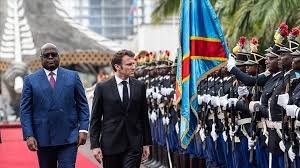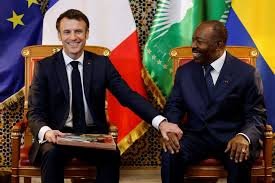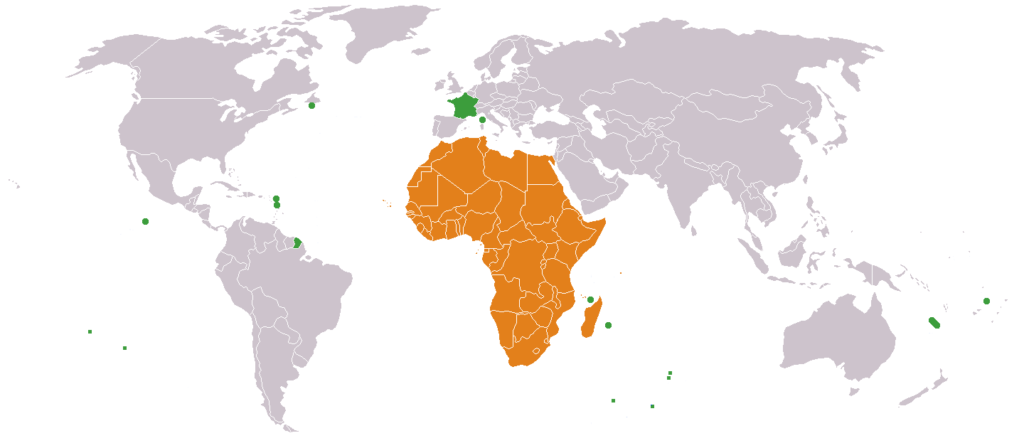Africa-France relations form a rich tapestry woven from centuries of historical, political, economic, and cultural interactions. From colonialism to independence, cooperation to contention, the relationship between Africa and France has evolved significantly over time, reflecting the complexities of global geopolitics and the changing dynamics within Africa. This comprehensive analysis explores the multifaceted dimensions of Africa-France relations, tracing their historical roots, examining their present state, and envisioning potential future trajectories.
Historical Context: Colonialism and Independence
The history of Africa-France relations is deeply intertwined with the legacy of colonialism. Like other European powers, France established colonial dominions across Africa during the 19th and early 20th centuries, exploiting the continent’s resources and imposing its political authority. This era left a lasting imprint on Africa’s socio-economic and political landscape, shaping the dynamics of post-colonial relations.
The struggle for independence marked a pivotal chapter in Africa-France relations. Throughout the mid-20th century, African nations embarked on quests for self-determination, challenging colonial rule and asserting their sovereignty. France witnessed waves of decolonization across its African territories, granting independence to former colonies such as Algeria, Senegal, Mali, and others. However, the process was often fraught with tensions, conflicts, and legacies of colonial exploitation, leaving enduring scars on the relationship between Africa and France.
Post-Independence Dynamics: Cooperation and Dependency
In the aftermath of decolonization, Africa-France relations entered a new phase characterized by cooperation, albeit within a framework marked by asymmetrical power dynamics. France maintained close ties with its former colonies, forging economic, political, and military partnerships that often reflected its strategic interests in the region. These ties were reinforced through mechanisms such as development aid, trade agreements, and military cooperation, positioning France as a key player in African affairs.

However, this relationship also engendered criticisms of neocolonialism and dependency, with some African nations accusing France of perpetuating unequal power structures and exploiting their resources for its benefit. Moreover, France’s interventions in African conflicts, such as those in Rwanda, Côte d’Ivoire, and Mali, have been met with mixed reactions, raising questions about the nature of its engagement and its commitment to African sovereignty.
Economic Interests and Trade Relations
Economic interests have long been a central aspect of Africa-France relations. France maintains significant investments in various sectors across Africa, including energy, infrastructure, telecommunications, and agriculture. French companies play a prominent role in African economies, contributing to employment, technology transfer, and infrastructure development.
Trade relations between Africa and France have also evolved, with Africa representing an important market for French exports and a source of raw materials and natural resources. However, the structure of trade has been criticized for its imbalance, with Africa often exporting primary commodities while importing manufactured goods from France. Efforts to promote more equitable trade partnerships and support African industrialization have been hindered by structural barriers and geopolitical considerations.
Diplomatic Engagement and Security Cooperation
Diplomatic engagement between Africa and France spans a wide range of issues, including peacekeeping, conflict resolution, and regional integration. France has been actively involved in mediating conflicts and supporting peace initiatives across Africa, deploying troops and providing logistical support through initiatives such as Operation Barkhane in the Sahel region.

Security cooperation between Africa and France has also deepened in response to shared challenges such as terrorism, organized crime, and instability. France has collaborated with African partners to strengthen security capacities, enhance border controls, and counter extremist threats. However, these efforts have faced criticism for their unilateral nature and perceived lack of consultation with African stakeholders.
Cultural Exchanges and Soft Power Dynamics
Cultural exchanges form an integral part of Africa-France relations, reflecting the historical ties and shared heritage between the two regions. France has long been a cultural powerhouse, exporting its language, literature, art, and cinema to Africa and influencing cultural expressions across the continent. Similarly, African cultures have left their mark on French society, enriching its diversity and contributing to its cultural landscape.
France’s soft power extends beyond cultural domains to encompass education, language, and media. French language and educational institutions have a significant presence in Africa, offering opportunities for academic exchange and cultural immersion. Additionally, French media outlets maintain a strong presence in African markets, shaping public discourse and influencing perceptions of France and its policies.
Challenges Opportunities: Towards a New Paradigm
Despite the deep historical and contemporary ties between Africa and France, the relationship faces numerous challenges and opportunities in the 21st century. Addressing issues such as economic inequality, political instability, and security threats requires a nuanced and multidimensional approach that prioritizes African agency, mutual respect, and equitable partnerships.
One of the key challenges lies in overcoming the legacies of colonialism and fostering genuine post-colonial relations based on equality and mutual benefit. This entails acknowledging historical injustices, promoting reconciliation, and empowering African nations to chart their development trajectories.

Moreover, economic cooperation between Africa and France must be reconfigured to prioritize sustainable development, inclusive growth, and shared prosperity. This requires diversifying trade relations, promoting value addition, and supporting local industries to reduce dependency on primary commodities and enhance economic resilience.
In the realm of diplomacy and security, Africa and France must work towards enhancing multilateral cooperation, strengthening regional institutions, and fostering inclusive dialogue to address common challenges collectively. This entails respecting African sovereignty, engaging with diverse stakeholders, and aligning interventions with local priorities and aspirations.
Cultural exchanges and people-to-people interactions remain vital avenues for fostering understanding, empathy, and cooperation between Africa and France. Embracing cultural diversity, promoting intercultural dialogue, and investing in educational exchange programs can contribute to building bridges and nurturing enduring partnerships based on shared values and mutual respect.
Africa-France relations epitomize the complexities and nuances of contemporary global dynamics, reflecting a shared history marked by colonialism, independence, and post-colonial cooperation. While the relationship has evolved significantly over time, it continues to face challenges stemming from historical legacies, economic disparities, and geopolitical realities.
However, amidst these challenges lie immense opportunities for forging a new paradigm of partnership grounded in mutual respect, shared prosperity, and inclusive development. By prioritizing African agency, fostering equitable economic relations, enhancing diplomatic cooperation, and embracing cultural diversity, Africa and France can chart a path towards a more resilient, prosperous, and interconnected future.
As Africa continues to assert its place on the global stage and France reaffirms its commitment to its African partners, the dynamics of Africa-France relations are poised to undergo further transformations, shaping the trajectory of both regions in the 21st century and beyond.
